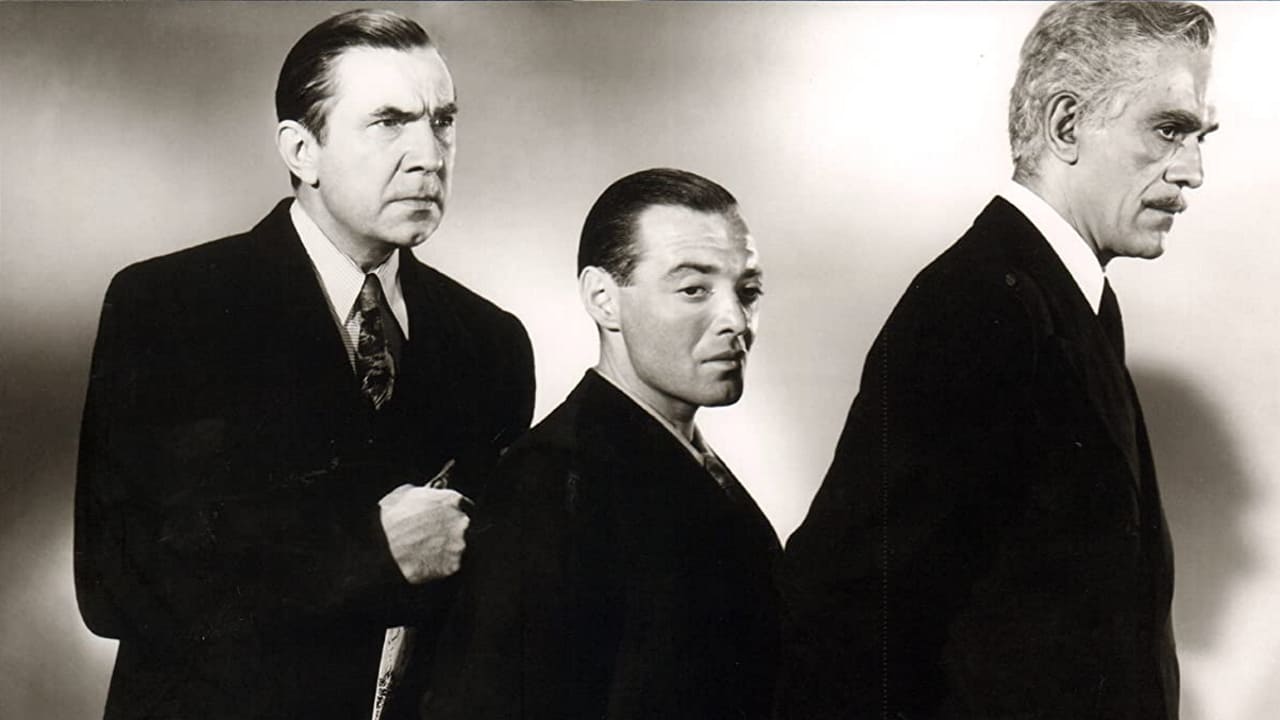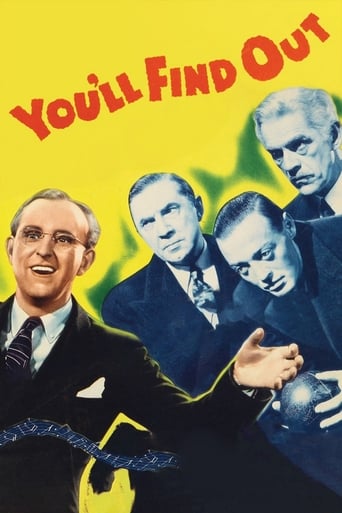

Better Late Then Never
... View MoreThe film was still a fun one that will make you laugh and have you leaving the theater feeling like you just stole something valuable and got away with it.
... View MoreAmazing worth wacthing. So good. Biased but well made with many good points.
... View MoreIf you're interested in the topic at hand, you should just watch it and judge yourself because the reviews have gone very biased by people that didn't even watch it and just hate (or love) the creator. I liked it, it was well written, narrated, and directed and it was about a topic that interests me.
... View MoreIt's good to see this movie is now available on an excellent Warner Brothers DVD entitled "Karloff & Lugosi Horror Classics". (The other titles in this four DVD set are The Walking Dead, Frankenstein 1970, and Zombies on Broadway). Mind you, it's not as entertaining on a third viewing as it is on a first or second – but what movie is? The surprises here are not only in Director David Butler's whodunit itself (when it finally gets going after a very long introductory sequence delightfully showcasing Kay Kyser and his band and his fabulous vocalists, Ginny Sims and Harry Babbitt) and the twists in the plot but in some of the characterizations. The talented Mervyn Bogue, for instance, who was actually the manager of the Kay Kyser Band in real life, is just a drag when he runs through his routines on a third viewing. Also, one is more horrified than amused in runthrough number three by Kay Kyser presenting himself as a first- class jerk and fraidy cat. On the other hand, nothing can dim Karloff, Lugosi, and especially Lorre who really comes to the fore when his two competitors are starting to lose their first and second times' charisma. And whatever happened to the lovely Helen Parrish? Ah, she went into TV as early as 1946 and died, alas, from cancer at the age of 35 in 1958.
... View MoreI knew my summary would get you. How is this movie like a Pet Rock and Disco?! Well, unless you lived through the 1970s or 80s, you probably can't understand WHY anyone would like a New Coke or own a Pet Rock (and frankly, at least in the case of Pet Rocks, I STILL don't understand it completely). They're just a couple things that seemed to make sense at the time but really baffle the younger generation. The same can be said for Kay Kyser and his band. At the time (the 1940s mostly), they were very popular and had enough clout that the studio starred them with Boris Karloff, Bela Lugosi AND Peter Lorre in this film. Yet, if you didn't live at that time (it was well before my time), you wonder why anyone liked this sort of "entertainment". After all, Kyser and his band mates are incredibly obnoxious and their humor is very, very broad (i.e., unsophisticated and cheesy). Frankly, I couldn't stand their antics nor did I appreciate that there were just too many musical numbers in the film. Because of these factors, the great supporting cast was given a back seat and fans of these actors will probably be disappointed.The film involves Kyser and the band coming to a mansion where a young lady and her wacky aunt live. Once there, the bridge is washed out and strange happenings begin. Eventually, it culminates in some attempts on Sally's life and a séance (of sorts). It's all played for laughs--and it's really not a horror movie despite the cast.Overall, it's passable entertainment at best. As a Lugosi and Karloff fan, I sure felt cheated having to watch Kyser and his knuckleheads.
... View MoreIn the 30's and 40's this kind of spooky whodunit was popular. These films would typically feature things like skeletons on strings, séances, secret passageways and fiends in hooded cloaks. To my memory, "You'll Find Out" seemed to be a quintessential film of that genre (even though it's comedy.)I saw "You'll Find Out" on American Movie Classics many years ago and have wanted to see it again. Does anyone know if this has ever been released on DVD? Looks like it has not. Anyway, if you like this kind of stuff, its is one of the best. You might think its a blast. Or you might think it's goofy garbage.Watch it and "You'll Find Out!"
... View MoreI see that most of the comments here focus on the movie's cast and genre, while only "A great gimmick in this movie!," 27 March 2003, identifies the special sound effect used, the Sonovox. It's my opinion that the Sonovox is the real "star" of this movie.In brief, the Sonovox involves a source sound (such as a sound effect or musical instrument) fed through a power amplifier into two small sound transducers, like those used for horn loudspeakers that have disk rather than cone diaphragms (constructed like earphones). These transducers are pressed against a performer's throat on each side of the area outside the voice box (larynx). Audio coupled from the drivers into the voice box becomes a substitute for vocal chord stimulation, while the performer silently and carefully forms the usual speaking or singing voiced sounds using only gestures made with the mouth and tongue. An especially high quality Sonovox effect results when a well trained performer additionally speaks the unvoiced fricative components ("s", "t", "sh", etc.). A sensitive microphone closely placed in front of the performer's mouth captures the Sonovox sound for recording.Most of my fondest Sonovox recollections come from the 1940's. A couple of famous examples of the Sonovox technique are found in radio advertising, where an antacid product was proclaimed by a chugging steam locomotive sounding like "Bromo-Seltzer, Btomo- Seltzer ...," and the need to use Lifebouy soap was promoted by a high-tone to low-tone fog horn that belched "Beeeee-Ohhhhh" (for body odor).Perhaps one of the grandest uses of the device is found in the RKO Radio Pictures 1940 movie You'll Find Out. Here the Sonovox produces ghostly sounds such as howling winds that talk, while the Sonovox mechanism is amply (albeit somewhat unrealistically) showcased. But the best part is the concluding musical numbers where Harry Babbitt causes musical instruments "sing" along with Ginny Simms. In the first tune Harry Sonovox's with the saxophone section and muted trumpets to the song "I'd Know You anywhere" (Ginny does this one in a normal fashion midway through the film). The melody then segues into "One Track Mind" sung by Ginny, with Harry adding duet support both naturally and through the Sonovox with the clarinets. This all too brief Sonovox musical segment still runs chills up and down my spine, and is the epitome of Sonovox enhanced entertainment.As can be deduced from the Sonovox operating description given above, producing a Sonovox sound requires specialized equipment generally unavailable to most hobbyists and musicians. However, in the early 1970's Peter Frampton developed a Sonovox like device known as a Talk Box. This much simplified unit involves a single transducer with an flexible plastic tube to transfer electric guitar music to the mouth of the performer. By mouthing the words or other effects, the guitar player emits a Sonovox type sound into a microphone. Talk Boxes may be obtained commercially for between $100-$300. But this isn't the only modern imitation of the Sonovox. The implementation of artificial speech by means of the channel vocoder provides another way for doing the job. Quite a few hardware and software versions of these exist. There is a down-loadable PC program that is quite effective in producing Sonovox sounds and music, and the best thing about it is that it's free.
... View More